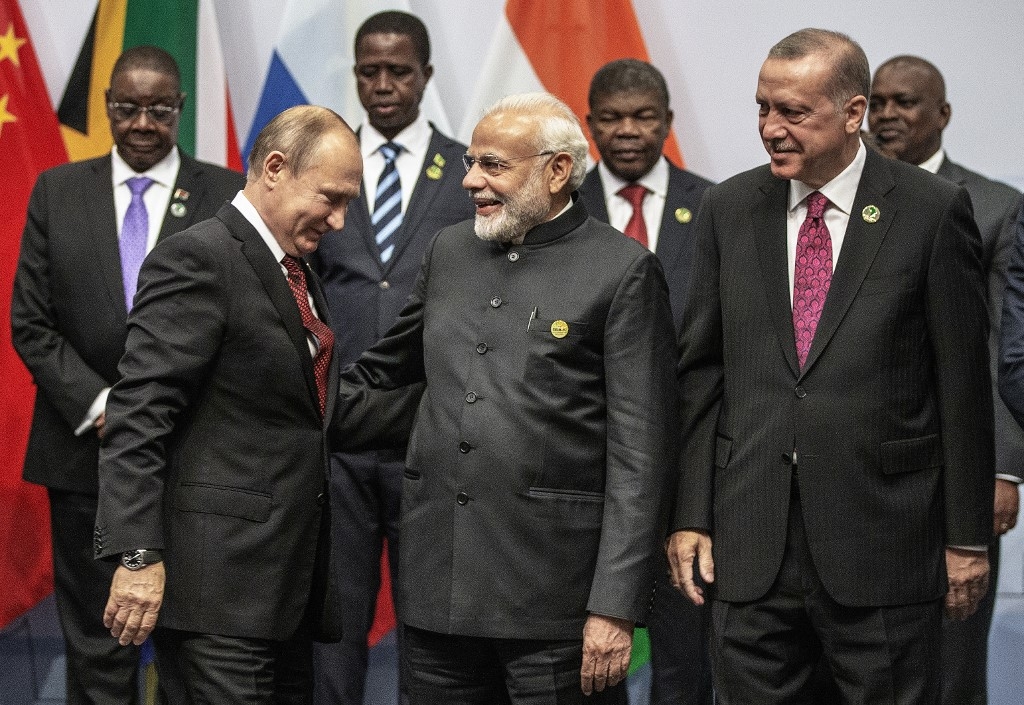Turkey’s recent application to join BRICS has stirred discussions about its future direction. With the 2024 BRICS Summit in Russia approaching, Turkey’s decision raises questions about its relationships with both the East and West.
What is BRICS?
BRICS started as an informal group in 2009, consisting of Brazil, Russia, India, and China. It was created to offer a platform for these major emerging economies to challenge the Western-dominated global order. South Africa joined in 2010, turning the group into BRICS. In January 2024, new members like Egypt, Ethiopia, Iran, and the United Arab Emirates were added. BRICS countries now represent about 45% of the global population and 28% of the world’s economy. They also produce more than a third of the world’s crude oil.
Turkey’s Application
Turkey, a NATO member and EU candidate, officially applied to join BRICS last week. Russia, a leading member of BRICS, has welcomed this interest. While some analysts view this move as Turkey exploring alternatives, others worry that it signals a drift from its traditional Western alliances.
Turkey’s membership in NATO, a military alliance created to counter the former Soviet Union, makes this application stand out. No other NATO member has sought membership in a bloc like BRICS, which is dominated by Russia and China.
What is Driving Turkey’s Move?
Turkey’s interest in joining BRICS comes at a time of increased tensions with Western nations. Several factors may be influencing Turkey’s bid. One reason is its dissatisfaction with slow progress in its bid to join the European Union, which has been stalled since 2005. Concerns over Turkey’s crackdown on opposition and other human rights issues have delayed its EU membership.
Turkey’s 2020 purchase of the Russian S-400 missile system led to U.S. sanctions. This $2.5 billion deal strained relations with NATO, as the system is seen as a threat to U.S. military assets. Turkey is also frustrated by its ongoing differences with NATO allies over how to handle conflicts, like the war in Ukraine.
Turkey’s position on Russia’s invasion of Ukraine is unwavering, notwithstanding its acquisition of Russian military hardware. President Recep Tayyip Erdogan has expressed unwavering support for Ukraine’s territorial integrity and called on Russia to return annexed Crimea to Ukraine.
Turkey’s growing trade relationship with China, which reached $48 billion in 2023, may also explain its interest in BRICS. However, most of Turkey’s trade with China consists of imports, while its trade with the EU is more balanced.
What are the Implications?
Turkey’s BRICS membership bid raises questions about its global positioning. On one hand, it signals that Turkey is exploring alternatives to Western alliances. On the other hand, many analysts believe BRICS membership is not a practical alternative to its existing partnerships.
Muhdan Saglam, a Turkish analyst, views this move as Turkey showing that it has options beyond the West. He notes that BRICS is not likely to be a real alternative to NATO or the EU in terms of economic or defense benefits. Instead, this bid could have more of a political impact. By allowing Turkey to leverage its relations with both BRICS and Western nations.
Turkey’s Finance Minister Mehmet Simsek has also downplayed the economic significance of BRICS, referring to it as a “dialogue platform” rather than a formal economic bloc like the EU. He has emphasised that the EU remains Turkey’s main partner for trade, investments, and tourism.
Concerns in the West
Many Western analysts see Turkey’s interest in BRICS as a sign of its gradual shift away from the Transatlantic community. Asli Aydintasbas, a fellow at the Brookings Institution, believes that while Turkey may want to maintain its NATO membership, its application to BRICS should not be ignored. She argues that Turkey is inching away from the West, which requires careful strategic thinking by the U.S. and its allies. Given Turkey’s geographic location and influence in the region, its potential drift from NATO could have significant implications for international security and diplomacy.
Road Ahead
Turkey’s application to join BRICS highlights its balancing act between the East and West. While the move may be more symbolic than practical, it suggests that Turkey is seeking to diversify its global relationships. The outcome of this bid could shape Turkey’s future role in international politics, especially as it navigates its relationships with both BRICS and its Western allies.

